#judicial duel
Video
youtube
A Judicial Duel - Some Context
#judicial duel#The Exiles#HEMA#knightly combat#duelling#fencing#sword#longsword#armour#harnischfechten#Fiore#Fiore dei Liberi#fighting#Fighter#Knight#paladin#chivalry
40 notes
·
View notes
Text
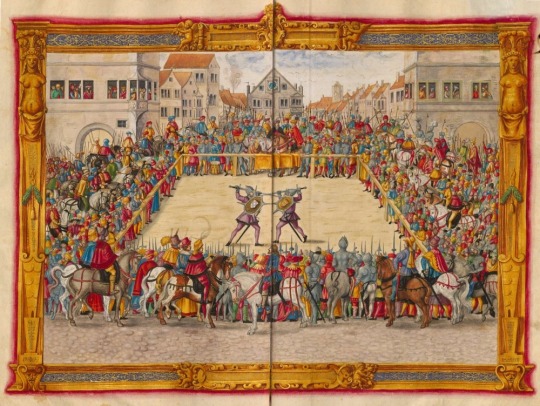
Judicial duel between Marshal Wilhelm von Dornsberg and Theodor Haschenacker in the Augsburg wine market (1409). Dornsberg's sword broke early in the duel, but he succeeded to kill Haschenacker with this gentleman’s own sword. Their shields were kept in St. Leonard’s Church outside of Augsburg until it was destroyed in 1542.
#judicial#duel#trial by combat#trial#combat#duelling#germanic law#fighting#art#history#europe#european#medieval#middle ages#knights#gentlemen#wine market#augsburg#german#germany#marshal wilhelm von dornsberg#theodor haschenacker#sword#gentleman#knight#wepaons#armour#swords#shields
40 notes
·
View notes
Link
Anyone who may have seen “The Last Duel,” a film from last year, and wants to learn some of the historical background behind what was portrayed in the movie should read this article. It is less about the film itself as it is about the historic system of using duels as a judicial practice, including how such a practice originated and ultimately was abolished. Know that the article includes spoilers about the movie if you are planning to watch it. "The Last Duel” did poorly at the box office, but I saw it after it left theaters and enjoyed it. Starring in the movie are Matt Damon and Adam Driver as the male leads and Jodie Comer as the female lead.
#2021#adam driver#article#cinema#france#french history#historical background#historical practice#historical system#history#interesting#jodie comer#judicial practice#judicial system#matt damon#medieval#middle ages#movie#society#the last duel
5 notes
·
View notes
Text
for the record, i never mind like spamming or rebog spamming or reblogging any posts i’ve made. i’ve had this concern directed my way via tags and anon asks, and i’m making a blanket statement: this blog is public. everything on it is for public consumption, and any way you chose to engage with what i post is okay by me.
#i just do not want anyone screencapping direct messages i send to them but i'm more judicious on who i direct message#the only time i've ever really used direct messages tho is to clarify a point that would feel mean making public#esp if it's a fairly innocuous mistake#the same goes with my public discord server tbh. messages i send in there are fine to screencap as they're in a public setting#i can't really get mad about people interacting with content i put out for public consumption#while originally this blog was meant for me to yell about yugioh duel monsters without annoying my friends#it seems that the case is that people actually enjoy that yelling#and again: it is fine to interact with it! it is fine to reblog it! it is fine to like spam it however you see fit!
6 notes
·
View notes
Text
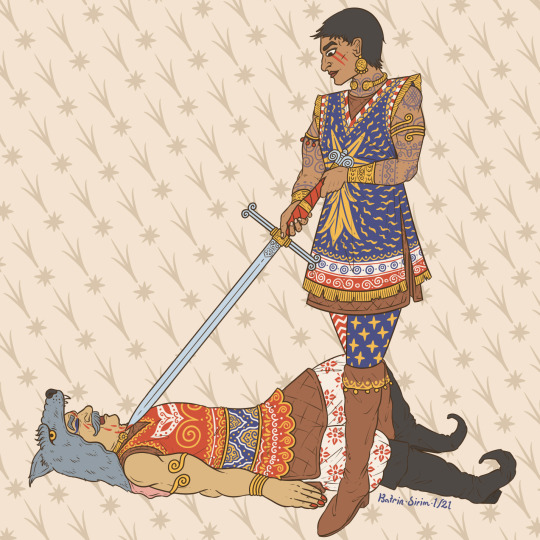
Tain Hu stands victorious in a judicial duel.
#artists on tumblr#fantasy#illustration#the traitor baru cormorant#baru cormorant#tain hu#fantasy art
334 notes
·
View notes
Note
Speaking of swashbuckling, do you know of any context in which a modern reader should approach Man in the Iron Mask (besides being the end of a larger work, and also loosely influenced by history)? I found it surprisingly anti-climactic (titular character is barely in it), and a Shoot the Shaggy Dog Story where no good deed goes unpunished and all schemers get away scot free. Notably, all film adaptations have made the story more heroic. Is there some historical context I'm missing?
I don't know if I quite agree with your description - The Man in the Iron Mask is not a full story, but as you said the "end of a larger work." So to that extent, I think it's a mistake to think of the titular MITIM as a "character" - he's a MacGuffin, a catalyst for the larger conflict between Fouquet and Colbert, who are the real drivers of the plot that results in the tragic downfall of the Musketeers.

Indeed, I would argue the emotional heart of the story is the breakdown of the bonds between Athos, Porthos, Aramis, and d'Artagnan. D'Artagnan is forced to choose between his duty to Louis XIV and his friendship with Athos, under Fouquet's influence Aramis becomes d'Artagnan's enemy and arguably the main villain of the story, Porthos has to choose between Aramis and d'Artagnan - and in the final conflict Porthos is killed, Aramis is consumed by remorse, Athos dies of a broken heart, and only d'Artagnan gets a "good ending," becoming Marshal of France before dying a heroic death at the siege of Maastricht.
I think calling this a shoot the shaggy dog story is a bit unfair, because Dumas was writing historical fiction. D'Artagnan, d'Aramitz, de Porthau, and d'Athos were real people and really were close friends, and I would argue the Dumas stories give them a far more interesting and evocative arc than what happened in real life - Athos died in a random duel only three years after meeting d'Artagnan, Porthos resigned from the Musketeers to take up a significant judicial office in the provincial Parlement of Navarre and Béarn, and Aramitz retired from the Musketeers to become an abbot in Béarn. D'Artagnan's death at Maastricht was a famous historical event of its time and couldn't be changed.
40 notes
·
View notes
Text
I’ve been imagining Ryunosuke’s adventures as a Japanese lawyer immediately after the end of TGAAC 2-5.
After solving The Professor case, Ryunosuke Naruhodo returns to Japan with Susato and Yujin Mikotoba.
Once they’re back home, Ryunosuke wastes no time establishing his own legal practice, and starts to take on cases. Susato works closely with him as a judicial assistant.
Yujin Mikotoba continues to be a mentor figure, and keeps up with his own work as a doctor and professor at Yumei University.
Satoru Hosonaga often ends up investigating the same cases as Ryunosuke and Susato.
Rei Membami and Soseki Natsume both end up on the witness stand again at least once.
After winning an easy first case against Prosecutor Auchi following his homecoming, the next prosecutor Ryunosuke faces off against has a name that makes his blood run cold: Jigoku.
At first he thought it was Seishiro Jigoku, and that he apparently escaped from British prison. But Yujin Mikotoba corrects him: this isn’t Seishiro, but his successor and eldest son, Hideki Jigoku.
Hideki is a relatively new prosecutor, but he nevertheless shows incredible resolve during his time in court. He isn’t the type to give up easily. Hideki stands in court in spite of his father's crimes and dark clouds over his family name. He hopes to rise above that, and prove his tireless studies in law were worth it.
The majority of Ryunosuke’s first year as a Japanese lawyer is spent clashing with Hideki in the courtroom, as they both make a name for themselves.
Outside of court, the rivals are civil to one another, sharing tea together occasionally.
Hideki and Hosonaga develop a more typical Ace Attorney prosecutor - detective relationship. At first they start off on the wrong foot, but grow to trust one another as investigative partners.
Ryunosuke has been keeping in touch with Kazuma and the others in Britain through letters. He treasures any replies and gifts he receives.
Towards the end of his first year back in Japan (about a year after his final case in Great Britain), Ryunosuke becomes embroiled in a plot involving the Yakuza. Among other shady dealings, they have been trying to rig his and Hideki’s trials behind the scenes.
Around the same time, Kazuma has sent a letter that he will be making his way back to Japan to spend the New Year with Ryunosuke, Susato and Yujin.
Two months after the letter is sent, Yujin Mikotoba is framed for a murder that happens at Yumei University. Ryunosuke and Susato practically leap at the first opportunity to represent him.
Hideki leads the prosecution and must weigh his feelings about his father's former friend against his duty as a man of the law. In the end he chooses to let the evidence and testimony decide Mikotoba's fate, and he puts his emotions aside. Unlike his father, he chooses to keep his integrity.
During one of the investigations related to the case, Hideki is shot in his right shoulder by a member of the Yakuza. Hosonaga manages to get him to a hospital in time to save his life, but he’s unable to continue with the trial.
Ryunosuke and Susato visit Hideki in the hospital, and they are handed key evidence that the prosecutor had to guard with his life. Leaving the rest to them is all he can do now.
There is uncertainty as to who will be on the prosecution side in Hideki Jigoku's place.
The trial begins, and a familiar voice says “The prosecution is ready, Your Excellency.”
Kazuma Asogi had decided to take the case. Him and Ryunosuke begin their promised “duel of words.” Yujin Mikotoba has full faith in their abilities to uncover the truth and save his life.
Kazuma appears calmer than the last time he faced Ryunosuke in court. Now that he's freed from the burden of the Professor case, he hopes to prevent history repeating with Mikotoba, who he still owes a lot to. It's clear he learned a lot as a prosecutor and a person from the year he spent studying under Van Zieks.
Ryunosuke, Susato and Kazuma hear enough testimony and present enough evidence to find the true culprit and have Yujin Mikotoba declared Not Guilty. The case is solved and they are all free to spend time together.
The four of them make sure to pay Hideki a visit because they couldn’t have made this outcome happen without his efforts in the investigation.
On New Year's Eve, everyone stops by Yujin Mikotoba's house to celebrate. Yujin has a few photographs taken to commemorate the occasion.
A few months later, Herlock Sholmes gets a letter from his old partner, along with the photograph of his friends from the east (along with a new face among them.) Sholmes shows this to Iris and insists they gather Gina, Toby, and Van Zieks to take a photograph of their own.
#Lynn’s writing#headcanon#brainstorming#The Great Ace Attorney Chronicles#Post game#The Great Turnabout Continues#Ryunosuke Naruhodo#Yujin Mikotoba#Susato Mikotoba#Satoru Hosonaga#Kazuma Asogi#OC#Hideki Jigoku
42 notes
·
View notes
Note
(reworked some of the wording, i hope this is better!)
aita for doing what i had to for my country?
to be clear, i am certain i am in the right. however, i assume this "tumblr aita" portal that has opened before me is a new methods of appealing for parole, so i will explain my situation. apologies for the long post; 732 hours 6 minutes and 2 seconds in a jail cell grinds on any human psyche.
a decade ago, i (43m at the time, 53m now) learned that an aristocrat had been murdered. he was known for mistreating his servants and furthering regressive tax policies, so i felt no sorrow; as part of the investigation into his death, however, i realized the culprit was my colleague K (33m at the time). i confronted him with my evidence and he confessed, but pleaded with me to not reveal his secret to his brother and wife. no one else had deduced K's crimes yet - he was a prosecutor of high renown, and therefore above suspicion - so i agreed.
witnessing the happiness of the people freed from the late aristocrat's rule, however, i realized K was in a uniquely powerful position to rid our city of evil. i convinced him to continue eliminating such untouchable members of the upper class, including the chief justice at the time, who was too weak to truly punish criminals. K agreed.
everything was going well until another person involved in the investigation, G (34m at the time), independently deduced that K was the culprit. they decided to have a duel to the death over this, for… some reason. K died in the duel, but left behind a will implicating me as the mastermind and blackmailer behind his killings - despite me not having harmed a single soul!
despite this betrayal, i felt it would harm the city's morale if they realized K (an aristocrat himself as well as a famous prosecutor) was the "serial killer," so i struck a deal with G to implicate G as the killer instead, since he was an exchange student from overseas and therefore much less well-known. his fellow exchange student (S, 33m at the time) and i would help fake his execution afterwards so he could escape to relative safety.
G agreed. again, i did not harm anyone in doing this.
unfortunately, on the night we were to dig G out of the grave, some grave robber came along and witnessed G coming out. naturally the public's trust in the judicial system would disintegrate if they learned a serial killer was not properly executed, so our hand was forced: i convinced the fellow exchange student S to shoot G.
now 10 years later, crime is on the rise again. i am - was, i suppose; will be again, hopefully - the chief justice now, but even in this position i cannot do enough to stop the flood of pickpockets and swindlers alike. thus i assembled a loyal group of people to help me eliminate those upper-class criminals escaping guilty verdicts through bribery and blackmail, and also to help me attain the position of attorney general so i may continue to implement policies to stifle crime.
unfortunately, a truly irritating detective and a defense attorney revealed my actions to her majesty the queen. apparently it is wrong to convince people to stop criminals? and despite all i have done to lessen crime - despite the fact that i have not laid a finger on anyone myself - the queen ordered me to face a public courtroom, and thus i was thrown into jail.
everything i've done for this country. everything i've done for the queen. and yet.
aita?
25 notes
·
View notes
Text
Kaiba in his scapegoat-pattern buttondown PJs and his fluffy bathrobe and his slippers wandering around his house. tomorrow, as a result of his dedicated lobbying, bribing, blackmail, and extortion, domino city is passing legislation that replaces the judicial system with duel monsters. He's not thinking about this, though. once he achieves something, it loses its appeal to him. He pours himself his first cup of coffee of the day. He's thinking about how to use the crystal cloud network to look up all the different ways people think about dragons, and how often, and how to triangulate the location of the best dragon-thinker with satellites so he can kill them on the spot or befriend them, depending.
65 notes
·
View notes
Text
Case: The Path of the Wolf pt 2 (Seeker Camp)
While exploring the south of Limgrave, I came upon a another heavily fortified camp. Nobles, sellswords, Godrick soldiers... with defensive fortifications, and stationed on a hill. Whatever they were protecting must be valuable.
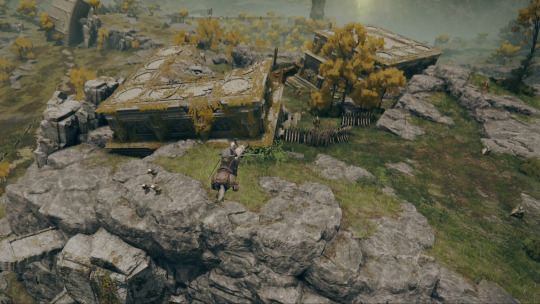
The spirit spring nearby seemed like a flaw in their defenses as it gave me easy access to their back lines. It was still a pretty rough fight and I barely made it out alive. They had noble sorcerers acting as sharpshooters from the large ruin fragments, and there were far more than I anticipated in the middle section of the encampment.
They seemed to be putting the nobles to work, using their compulsive urge to search to their advantage. Strange world, where nobles are slaves to the footmen.

In a chest, I found a Great Épée, but that's probably not what they were guarding. Just decided to bring an old weapon for judicial duels along with them for some reason.

Far more interesting was a scroll I found on one of the sorcerers. It had an unusual triple-roll design which suggested some kind of code. I tried several configurations but couldn't make heads or tails of it. One thing I did recognize though was my family crest! The same one that my glintblade spell uses. The voice didn't even need to tell me this was a Carian scroll, but it added that the Carians were the heads of the Academy of Raya Lucaria.
Well, that settles that! My ancestors founded a magic college in the Lands Between. My excitement was immediately tempered by the realization that it's probably fallen just as far as the rest of this land.
Still, this was disappointing. It was something the sorcerer had brought with him, not something valuable that they were searching for. I'm a fair bit more canny than any soldier or half-dead noble, so I got to searching for myself.

I found it. A bit further up the hill than where they were looking, near a giant stone astrolabe. A small shard of starlight, like a bit of the night sky fallen to earth. It didn't seem to have any substance to it, but I could still hold it in my hands. I wonder if anyone who couldn't see Grace is even capable of finding this.
Now, to speculate on what was going on here. I doubt that these soldiers came from Caria. They have the tree-and-beast crest of Godrick's soldiers. The sorcerers at least studied at Raya Lucaria, but this is an advanced text. It's safe to assume that they wouldn't have just taken it with them. It must've been given to them. Perhaps it could even be used as a guide to finding the shard?
If that's the case, then someone affiliated with the Carian Royal Family and/or Raya Lucaria gave it to them. Sellen is an obvious choice, so I'll ask her, but she's a "reviled, apostate witch." It seems unlikely she could have this kind of scroll except by stealing it. Another possibility is that Godrick could be allied with Caria, but I'd need more evidence for that.
A third possibility is that they might be working for a third party. Someone with ties to Caria, but operating on their own. Perhaps Blaidd's unseen master?
That felt more like it.
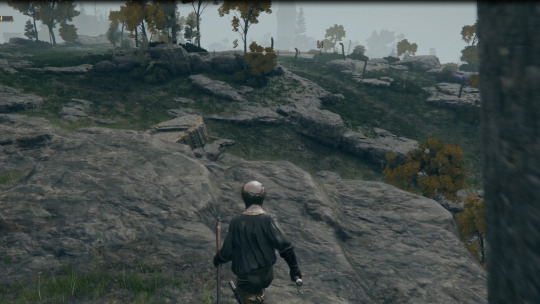
Having cleared the camp, I noticed something unusual on the second hill, across the rift cut by the road. Spherical rocks stacked in an impossible way? This warrants further investigation.
Questions:
Who was responsible for this dig site?
Why did they need the Starlight Shard?
What's contained in the scroll?
6 notes
·
View notes
Text
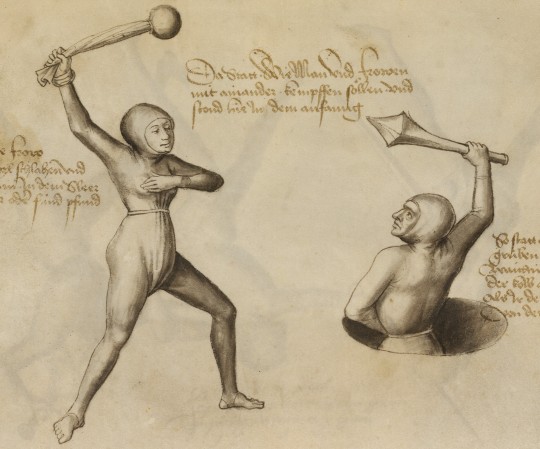
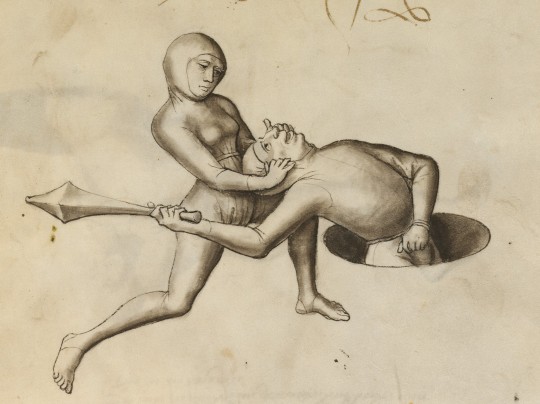
a woman and a man competing in a medieval judicial duel. the man is standing in a pit to even out their chances of winning
detail from Hans Thaldorfer's "Fechtbuch" (martial arts manual), german manuscript, 1467
source: München, Bayerische Staatsbibliothek, Cod. icon. 394 a, fol. 122v and 124v
#medieval#medieval illustrations#fechtbuch#medieval manuscripts#martial art#history of law#gender history#15th century#gender
38 notes
·
View notes
Text
As part of my Neuvillette-adjacent reading, I learned about Hans Talhoffer's combat manual of 1467. It depicts the numerous methods and types of judicial duel and...uh yeah. Not for the faint-hearted.
14 notes
·
View notes
Note
'Alds have a difficult time keeping secrets from each other'. Is this because of that weird 'eye contact = soul sharing' thing? And is murder in Alderode legal? There's a limit on Coppers and Jets having children, right, so do people shrug and say 'We'll at least they're not ADDING to the 'quota'?
The Dammakhert gives Alds (except Soud) an empathic extra sense they can tap into when it comes to their relationships with each other. In effect it makes it difficult for them to lie to each other, as they can sense deceit. Very hard to run a scam there, Jab Beadman thinks they're frigging aliens probably.
Murder is not legal in Alderode except when it is? Much of their judicial system relies on dueling. Rather than sue someone, you duel them, either directly or via a surrogate. If someone dies in a duel, that sure does settle the lawsuit, and if the rules of engagement are adhered to, it's essentially legal murder.
While there is a quota on Jet and Copper children, it's enforced via financial penalties and state seizure, not murder. Excess children you cannot pay for are taken by the state and given to... we'll call them orphanages, for now.
23 notes
·
View notes
Note
So question about the end of the Mace and Palpatine duel. Should Mace have arrested Palpatine instead of try to kill him when Palpatine was at his mercy?
Granted, there's a lot going on there regarding Sheev's manipulations. He's playing the part of defenseless old man and doesn't have his lightsaber while Mace is standing over him pointing his lightsaber at him when Anakin comes in, he then uses Force Lightning, possibly hoping it would convince Mace he was too dangerous to be kept alive (since Mace continued to say Sheev was under arrest right before Anakin showed up) which seemed to work since Mace said Palpatine, who controlled the Senate and courts, was too dangerous to be kept alive, then more back and forth (which, with Anakin's last argument that he needs Palpatine, does suggest Anakin didn't care about any judicial process, he just wants Sheev's knowledge), then Mace goes for the kill and we know what happened next.
So I guess I'm asking, is Mace right, was Palpatine too dangerous to be kept alive and needed to die right there? Or should he have gone for the arrest regardless?
For me, while I can see reasons for both options, I can find understanding in both paths, I think Mace should have killed Palpatine.
It doesn't really matter whether Anakin's protest is a hollow one (even though it is) because the question is whether or not it's the Jedi way is the real question we're being asked, but first of all, what does that mean? What is "the Jedi way"?
Presumably, it means to not kill an unarmed man whom you have defeated. That's not the case for Palpatine, he's still got his Sith lightning and he is still in the seat of his power, he still controls the Senate and the courts and there will be no consequences for him from this and more innocent people will suffer in the galaxy if he's not stopped here and now.
And even if it were against the Jedi way, Mace had to weigh his own personal morals against the chance he has to save lives--that's the entire reason the Jedi didn't dodge the draft the Republic put on them for the Clone Wars, because it was either keep their morals + everyone dies OR they bend their morals and save innocents. That's exactly the same choice Mace faces in that moment and he makes the same decision--innocent lives are more important than Mace Windu keeping his hands clean.
Had Mace arrested Palpatine (so Anakin wouldn't betray him), he may well have lived to walk out of that office (maybe, I'm pretty sure Palpatine was intending to kill him right then regardless, he already was planning Order 66, the Jedi were disliked enough thanks to his propaganda that the public would turn a blind eye to their genocide whether Mace stood down or not), but the Jedi were already in Palpatine's sights and he never would have stayed inside a cell long enough for it to have any consequences.
The only way the Jedi genocide and the rise of the Empire had a chance of being stopped then was if Mace had succeeded in killing Palpatine or if Anakin had done what he was supposed to do and killed Palpatine.
203 notes
·
View notes
Text

LETTERS FROM AN AMERICAN
April 9, 2024
HEATHER COX RICHARDSON
APR 10, 2024
Yesterday, former president Trump released a video celebrating state control over abortion; today, a judicial decision in Arizona illuminated just what such state control means. With the federal recognition of the constitutional right to abortion gone since the Supreme Court overturned Roe v. Wade, old laws left on state books once again are becoming the law of the land.
In a 4–2 decision, the all-Republican Arizona Supreme Court today said it would not interfere with the authority of the state legislature to write abortion policy, letting the state revert to an 1864 law that bans abortion unless the mother’s life is in danger. “[P]hysicians are now on notice that all abortions, except those necessary to save a woman’s life, are illegal,” the decision read.
The court explained: “A policy matter of this gravity must ultimately be resolved by our citizens through the legislature or the initiative process…. We defer, as we are constitutionally obligated to do, to the legislature’s judgment, which is accountable to, and thus reflects, the mutable will of our citizens.”
The idea that abortion law must be controlled by state legislatures is in keeping with the 2022 Dobbs v. Jackson Women’s Health Organization decision that overturned Roe v. Wade. But it’s an interesting spin to say that the new policy is protecting the will of the citizens.
The Arizona law that will begin to be enforced in 14 days was written by a single man in 1864.
In 1864, Arizona was not a state, women and minorities could not vote, and doctors were still sewing up wounds with horsehair and storing their unwashed medical instruments in velvet-lined cases.
And, of course, the United States was in the midst of the Civil War.
In fact, the 1864 law soon to be in force again in Arizona to control women’s reproductive rights in the twenty-first century does not appear particularly concerned with women handling their own reproductive care in the nineteenth—it actually seems to ignore that practice entirely. The laws for Arizona Territory, chaotic and still at war in 1864, appear to reflect the need to rein in a lawless population of men.
The 1864 Arizona criminal code talks about “miscarriage” in the context of other male misbehavior. It focuses at great length on dueling, for example—making illegal not only the act of dueling (punishable by three years in jail) but also having anything to do with a duel. And then, in the section that became the law now resurrected in Arizona, the law takes on the issue of poisoning.
In that context, the context of punishing those who secretly administer poison to kill someone, it says that anyone who uses poison or instruments “with the intention to procure the miscarriage of any woman then being with child” would face two to five years in jail, “Provided, that no physician shall be affected by the last clause of this section, who in the discharge of his professional duties deems it necessary to produce the miscarriage of any woman in order to save her life.”
The next section warns against cutting out tongues or eyes, slitting noses or lips, or “rendering…useless” someone’s arm or leg.
The law that Arizona will use to outlaw abortion care seemed designed to keep men in the chaos of the Civil War from inflicting damage on others—including pregnant women—rather than to police women’s reproductive care, which women largely handled on their own or through the help of doctors who used drugs and instruments to remove what they called dangerous blockages of women’s natural cycles in the four to five months before fetal movement became obvious.
Written to police the behavior of men, the code tells a larger story about power and control.
The Arizona Territorial Legislature in 1864 had 18 men in the lower House of Representatives and 9 men in the upper house, the Council, for a total of 27 men. They met on September 26, 1864, in Prescott. The session ended about six weeks later, on November 10.
The very first thing the legislators did was to authorize the governor to appoint a commissioner to prepare a code of laws for the territory. But William T. Howell, a judge who had arrived in the territory the previous December, had already written one, which the legislature promptly accepted as a blueprint.
Although they did discuss his laws, the members later thanked Judge Howell for “preparing his excellent and able Code of Laws” and, as a mark of their appreciation, provided that the laws would officially be called “The Howell Code.” (They also paid him a handsome $2,500, which was equivalent to at least three years’ salary for a workingman in that era.) Judge Howell wrote the territory’s criminal code essentially single-handedly.
The second thing the legislature did was to give a member of the House of Representatives a divorce from his wife.
Then they established a county road near Prescott.
Then they gave a local army surgeon a divorce from his wife.
In a total of 40 laws, the legislature incorporated a number of road companies, railway companies, ferry companies, and mining companies. They appropriated money for schools and incorporated the Arizona Historical Society.
These 27 men constructed a body of laws to bring order to the territory and to jump-start development. But their vision for the territory was a very particular one.
The legislature provided that “[n]o black or mulatto, or Indian, Mongolian, or Asiatic, shall be permitted to [testify in court] against any white person,” thus making it impossible for them to protect their property, their families, or themselves from their white neighbors. It declared that “all marriages between a white person and a [Black person], shall…be absolutely void.”
And it defined the age of consent for sexual intercourse to be just ten years old (even if a younger child had “consented”).
So, in 1864, a legislature of 27 white men created a body of laws that discriminated against Black people and people of color and considered girls as young as ten able to consent to sex, and they adopted a body of criminal laws written by one single man.
And in 2024, one of those laws is back in force in Arizona.
Now, though, women can vote.
Before the midterm elections, 61% of Arizona voters told AP VoteCast they believed abortion should be legal in most or all cases, while only 6% said it should be illegal in all cases. A campaign underway to place a constitutional amendment protecting abortion rights on November’s ballot needs to gather 383,923 verified signatures by July; a week ago the campaign announced it already had 500,000 signatures.
It seems likely that voters will turn out in November to elect lawmakers who will represent the actual will of the people in the twenty-first century.
LETTERS FROM AN AMERICAN
HEATHER COX RICHARDSON
#Letters From An American#Heather Cox Richardson#women's rights#reproductive health#reproductive rights#MAGA authoritarianism#religious fundamentalism#Arizona#States rights#anti-woman
6 notes
·
View notes
Text
You Can't Message Your Way Out of Your Own Heartfelt Extremism
Following their preferred candidate getting absolutely blitzed in a swing-state judicial election due to his anti-abortion extremism, conservatives are now trying to argue that they need to pivot to better messaging on abortion.
There are a whole host of reasons why this won't work, starting with the fact that their favored "moderate", "compromise", "good message" alternative is Lindsey Graham's proposed nationwide compulsory women-maiming law. But another reason why it won't work is that the Republican Party cannot control the behavior of its own membership -- most notably, those the GOP's YOLO Joker caucus (federal judiciary division) -- who insist on nothing short of the absolute most draconian limits on reproductive care imaginable:
A federal judge in Texas blocked U.S. government approval of a key abortion medication Friday, siding with abortion foes in an unprecedented lawsuit and potentially upending nationwide access to the pill widely used to terminate pregnancies.
The highly anticipated ruling puts on hold the Food and Drug Administration’s approval of mifepristone, a medication first cleared for use in the United States in 2000. The ruling will not go into effect for seven days to give the government time to appeal.
U.S. District Judge Matthew J. Kacsmaryk, a nominee of President Donald Trump with long-held antiabortion views, agreed with the conservative groups seeking to reverse the FDA’s approval of mifepristone as safe and effective, including in states where abortion rights are protected.
On the one hand, Republicans need to find a way out of the abortion trap. On the other hand, unaccountable hack judges in Texas are banning abortion medication nationwide based on completely spurious, results-oriented reasoning, guaranteeing that the GOP's forced labor agenda stays front and center in all of its extreme, uncompromising splendor indefinitely.
The Texas injunction now is paired with a dueling injunction from a district court in Washington, which forbids any alteration by the FDA to the status quo (at least in the plaintiff states in that litigation; the judge declined to make his injunction nationwide). This means the case almost certainly is headed to the Supreme Court sooner rather than later. Will the Court actually follow the law for once, or will we get another (to borrow from Josh Blackman) "epicycle" as rule of law bends itself to satisfy the whims of anti-abortion extremists cloaked in Article III garb? Stay tuned.
via The Debate Link https://ift.tt/kTiznSU
21 notes
·
View notes